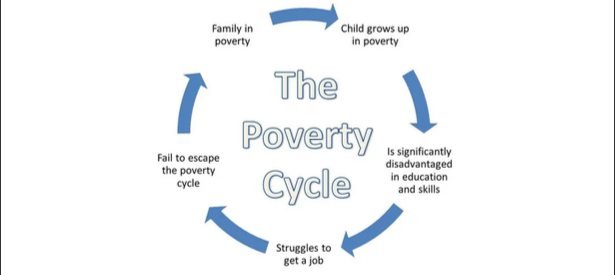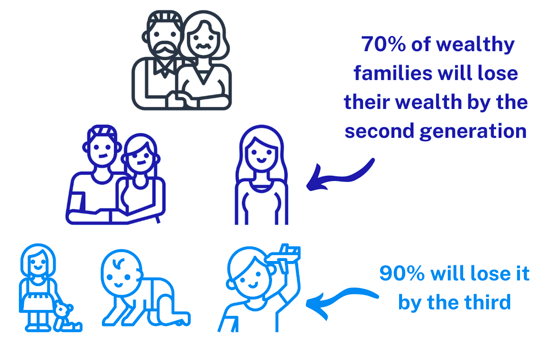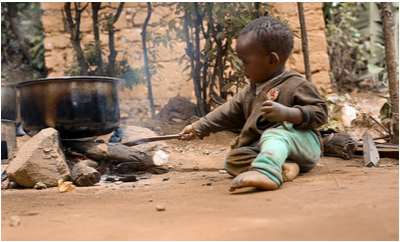
“There is a common misconception that poverty equals laziness, or equals to unemployment, or to some equals to frugality. That is not always the case though at some point poverty has something to do with the above. In reality, poverty is still a complex issue that reaches even those who report to work every morning – those employed. According to the latest ILO (International Labor Organization) estimates, 13 percent of all employed people in the world in 2018 were moderately poor and 8 percent were in extreme poverty (amounting to a global working poverty rate of 8 percent). Apparently, poverty is not solely an economic issue, rather a reinforcement cycle that encompasses a lack of both income and ability to consciously live within or below the available means and resources, hence blinding from minding the posterity. This is what births and fuels the generational poverty cycle.”

What is Generational Poverty?
Poverty as defined to be a state of low quality or insufficient in amount, can be either situational or generational. Situational poverty is a period of being poor caused by situational factors; a lack of job (let’s say upon one’s sudden resignation or being expelled from their work, one’s incapacitation due to illness or other factors, and so forth), it might be a certain macro economic crisis that affects the citizens, it might be disastrous factors like floods, drought, most crucially it can be death and often sudden death, and many others that can affect people’s finances in a way or the other.
Not only this, but worse enough situational poverty might be caused by a lack of budgeting and finance tracking; the practice of tracking one’s income and expenses or in line with and consideration of the mentioned factors which are most likely unpreventable and uncontrollable.

Generational poverty on the other hand, is a delayed situational poverty that crosses generations and generations which might be due to lack of a few practices like proper planning to adjust with the changed situation for the sake of survival but more to that; preparing for the betterment of the upcoming generations.
However, generational poverty has hopelessness as another psycho factor that has the lead especially to families that have spent time in situational poverty without change.
Now getting back to the matter, it sounds paradoxical to read ‘working poverty’ statistics; statistics of employed people who are poor, because most of us think and believe that unemployment is the key cause of poverty, and hence a continued unemployment leads to the same poverty in the posterity. Most of us think that by the time one is employed in one way or the other it is the endline of the poverty run race.
Others think that, by the time one wins certain bunches of bills in lottery, they are bidding a farewell to poverty, but it is always an astonishment to find that many of the very employed people, or those who have a recurrent income face poverty often finding themselves in insufficiency of money to afford some of the life essentials even to the very basics like shelter and others of a kind. This eventually converts into a generational lifestyle.

Sadly enough, we often find ourselves acquainted with this and always find ourselves falling into the same ditch, yet we don’t want this and none have planned this—
Magic or Manoeuvre?
But guess what, by a neglected simple manoeuvre we are strategically building a more intricate generational poverty cycle.
It is well evident that it is far beyond a lack of money, and lack of resources, beyond unemployment, and even at some point beyond incapacitation or death; but now it is about our approach of handling the flow of our resources, especially our income the time we have it or better put, our management.
Our behaviour towards the resources we are entrusted with, definitely has something to do with our financial situations because we are after all the managers, or stewards of what we have in a given period of our lifetime.
This means that our instant choices and decisions on when and how to spend or plan to spend our resources defines our ability or inability to survive both today and tomorrow, which implies that in this sense it is not about whether or not one is employed or whether or not one is still alive or dead but how they have used whatever resource they have been entrusted with, from the ability (both intellectual and rational) to think and work, to one of the remunerations of work – money even 100 RWF, which becomes our source of ability to survive.
The implication is that we have to draw more attention to our behaviours towards the resources presented to us for possession than the resources themselves.

It is not magic that happens by a snap of a finger, it is a journey to go, and worth to take. The manoeuvre is as simple as:
Planning
Budgeting
Saving
Investing
Building generational wealth
Tracking the efficiency and adjusting where necessary
Last but not least, passing on the same manoeuvre to the posterity.
Simple, isn’t it? Simple because the primary resource to endeavour on the journey is you. Your mindset change that instructs the behaviours to start living a financially free and relieved life, destroying the cycle of generational poverty to build a better now and tomorrow for both yourself and the next you.
Again, simple because there are advisory firms ready to join you on the relieving and exciting journey of breaking the rusty chains of the generational poverty cycle!
